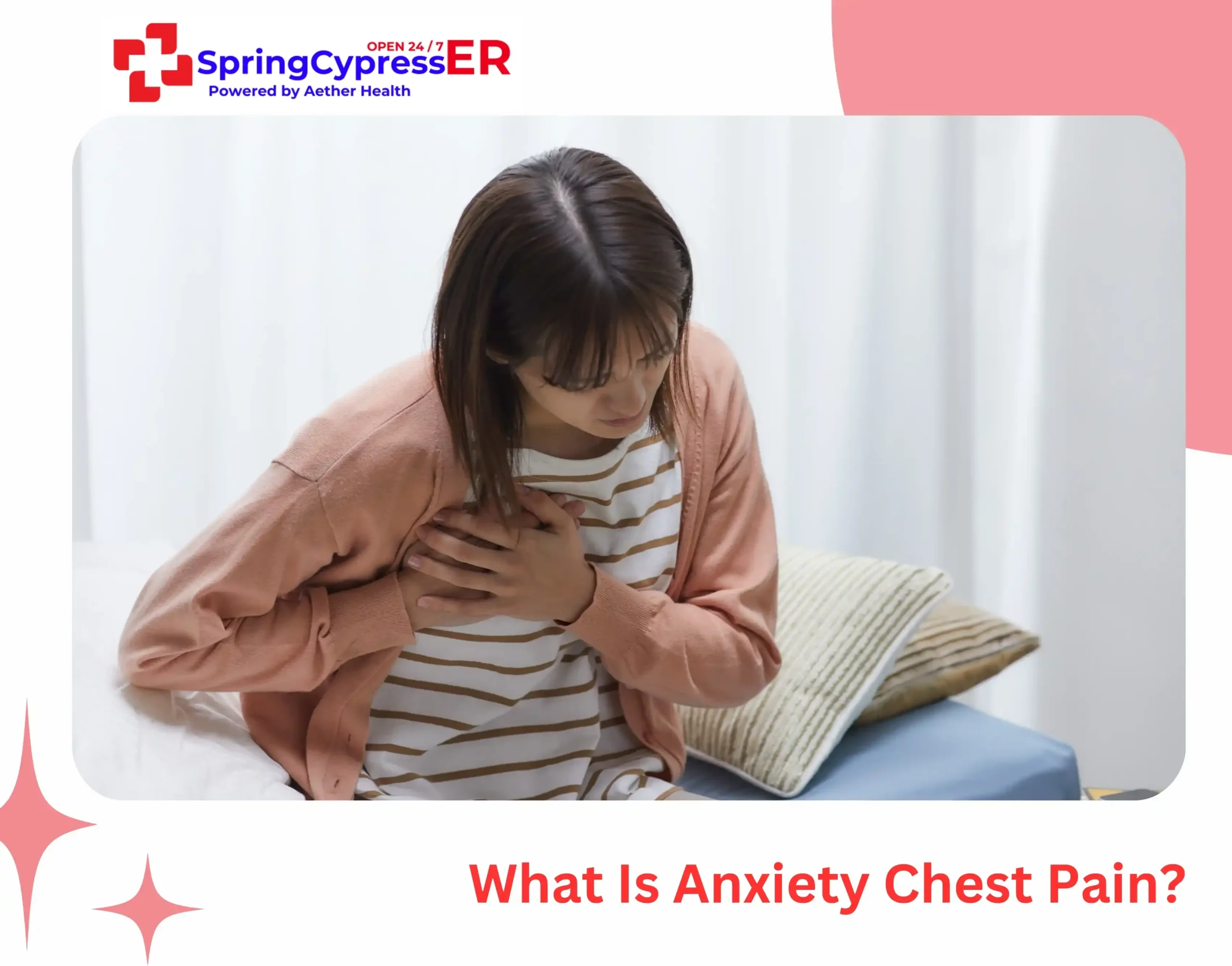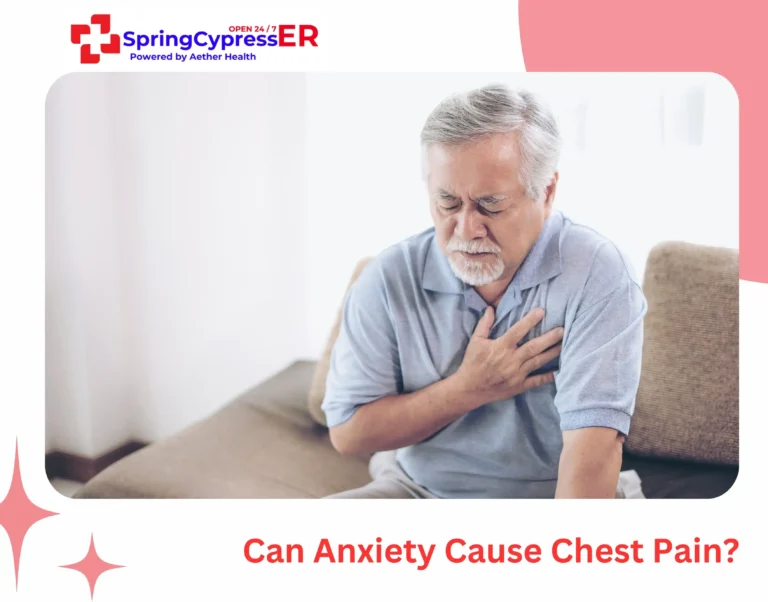What feels like a heart attack might actually be anxiety chest pain. That’s true. Anxiety triggers muscle tension, fast breathing, and a racing heartbeat. These changes lead to symptoms, such as chest pain, palpitations, and dizziness that feel almost identical to a real heart problem.
The tough part is you can’t always tell the difference in the moment. Some people dismiss their chest pain as stress and risk ignoring a real emergency. Others rush to the ER again and again, only to find their heart is fine. Both are exhausting.
That’s why it’s important to understand: can anxiety really cause chest pain, how does it happen, and how do you separate it from a cardiac issue? Knowing this brings peace of mind and helps you make the right decision about your health.
What Is Anxiety Chest Pain?

Anxiety-related chest pain is chest discomfort caused by stress or panic rather than heart disease. When your body reacts to fear or intense worry, it can cause real pain or tightness in the chest, which often feels alarming.
Anxiety-Related Chest Pain Symptoms
- A sharp or stabbing pain that comes and goes
- Tightness or pressure in the chest
- Burning or aching in one spot
- Shortness of breath or rapid breathing during stress
- Pain that eases once you calm down or distract yourself
Can Anxiety Cause Chest Pain? 6 Causes Explained
Yes, anxiety can cause chest pain. During anxiety or a panic attack, your body goes into “fight-or-flight” mode. Stress hormones increase your heart rate, constrict your chest muscles, and alter your breathing pattern. These reactions can cause pressure on your chest, resulting in pain or discomfort. There are multiple pathways through which anxiety can produce chest discomfort:
1. Muscle Tension
Anxiety often causes involuntary tightening of the chest and rib muscles. Prolonged tension can create soreness or stabbing pains, especially when you breathe deeply.
2. Hyperventilation
Rapid, shallow breathing changes the balance of oxygen and carbon dioxide in your blood. This imbalance can cause chest pain that mimics heart issues.
3. Adrenaline Surge
Adrenaline increases heart rate and blood flow. This sudden cardiovascular stress can make the chest feel heavy, constricted, or achy.
4. Gastrointestinal Factors
Anxiety can trigger acid reflux or indigestion. Stomach acid moving up into the esophagus may cause burning chest pain, often mistaken for cardiac discomfort. This also supports the question “can anxiety cause chest pain?” with a yes.
5. Increased Heart Awareness
People with anxiety are often hyperaware of bodily sensations. A normal heartbeat may feel exaggerated, and even mild chest discomfort can become frightening and painful when magnified by anxious thoughts.
6. Panic Attacks and Chest Pain
One of the most common scenarios is a panic attack. People experiencing a panic attack often believe they are having a heart attack because:
- Their chest feels tight or painful.
- Their heart is racing or pounding irregularly.
- Breathing feels difficult or impossible.
- They feel dizzy, detached, or about to faint.
The episode peaks within minutes and then gradually subsides. But the fear and memory of the pain can linger, causing more anxiety and sometimes more chest pain.
How Does Anxiety-Related Chest Pain Differ from Heart-Related Chest Pain?
Both anxiety and heart problems can cause chest pain, but there are key differences. Heart-related pain is a medical emergency, while anxiety pain often eases with calming techniques. Here’s how to tell them apart:
Symptoms of a heart emergency
- Heavy, squeezing, or pressure-like pain in the chest.
- Pain spreading to the arm, shoulder, neck, jaw, or back.
- Pain lasting more than a few minutes or recurring frequently.
- Breathing problems, dizziness, or fainting.
- Cold sweats or nausea.
- Pain not linked to stress or panic.
Symptoms related to anxiety or panic attacks
- Sharp or stabbing pain that comes and goes.
- Tightness or burning sensation in one spot.
- Pain is linked with stress, fear, or a panic attack.
- Rapid heartbeat or fast breathing during the episode.
- Symptoms ease with relaxation, rest, or distraction.
How to Manage Anxiety-Induced Chest Pain at Home

If your chest pain is clearly linked to stress or panic and eases with calming techniques, you can try simple steps at home:
- Practice slow breathing: Inhale through your nose for 4 seconds, hold for 2 seconds, then exhale slowly through your mouth for 6 seconds. Repeat until calmer.
- Use grounding techniques: Focus on your surroundings (name five things you see, four you can touch, three you hear, two you smell, one you taste). This helps shift attention away from panic.
- Relax your body: Gently stretch or release tight muscles in your shoulders and chest.
- Stay active and rested: Regular exercise, good sleep, and reducing caffeine can lower overall anxiety.
- Talk it out: Share your feelings with a trusted person, or consider counseling if chest pain from anxiety happens often.
Follow-up Care: Cardiac Check vs. Mental Health Support
After any episode of chest pain, it’s important to rule out heart problems first. Your doctor may recommend tests such as an electrocardiogram (ECG), blood work, or a stress test to assess your heart’s health. Even if the question “can anxiety cause chest pain?” is on your mind, these checks provide peace of mind by confirming whether the pain is cardiac or not.
If your heart is fine and chest pain is linked to stress or panic, follow-up with a mental health professional can help. Options include:
- Counseling or therapy to manage anxiety triggers
- Medication – if prescribed by a doctor for ongoing anxiety or panic attacks
- Lifestyle support, such as relaxation training, exercise, or support groups
When to See a Doctor
Seek emergency medical attention if chest pain is:
- Sudden, severe, or crushing
- Radiating to the arm, jaw, or back
- Accompanied by shortness of breath, fainting, or nausea
- Lasting more than a few minutes without relief
Final Thoughts
So the answer to “can anxiety cause chest pain?” is yes. But because heart problems can feel very similar, you should never ignore chest pain. Seek emergency care if it is severe, lasts more than a few minutes, or comes with shortness of breath, sweating, or dizziness.
At Spring Cypress ER, we’re here 24/7 to give you answers fast. With onsite lab testing, imaging, and experienced physicians, we can quickly tell whether your pain is coming from the heart or from anxiety. Either way, you’ll leave with clarity, relief, and a recovery plan.
FAQs
1. How do I know if my chest pain is a heart attack or anxiety?
Chest pain due to anxiety is often sharp, brief, and linked to stress or panic. Heart attack pain usually feels like heavy pressure that lasts more than a few minutes and may spread to the arm, jaw, or back. If unsure, seek emergency care immediately.
2. How can I stop chest pain during a panic attack right now?
Try slow, deep breathing to calm your heartbeat. Focus on inhaling through your nose and exhaling slowly through your mouth. Grounding techniques, such as naming objects around you, can also help reduce panic. If chest pain doesn’t ease quickly, call for emergency help.
3. When should I go to urgent care instead of the ER?
Go to the ER if chest pain is sudden, severe, lasts more than a few minutes, or comes with dizziness, sweating, nausea, or shortness of breath. Urgent care can help with mild chest discomfort that improves with rest or is clearly linked to stress.
4. Can panic attacks raise troponin or mimic a heart attack?
No, panic attacks can mimic heart attack symptoms, but they usually do not raise troponin, a heart damage marker. Only ER testing can confirm this. Because symptoms overlap, it’s safest to treat new or severe chest pain as a possible heart emergency.
5. Can anxiety cause chest pain every day?
Yes, frequent anxiety can cause repeated chest pain episodes. Ongoing stress may lead to daily tightness or discomfort. Even if you suspect anxiety, it’s important to see a doctor to rule out heart or lung conditions.





